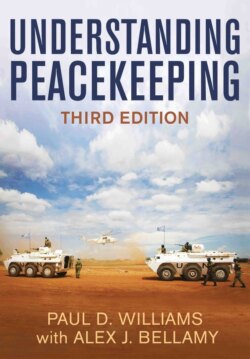Читать книгу Understanding Peacekeeping - Alex J. Bellamy - Страница 27
Critical theory
ОглавлениеIn international relations, critical theorists argue that our theories are constitutive of reality – that is, how we think about the social world shapes our behaviour in it, as well as vice versa. Analytically, critical theorists have focused on explaining configurations of power in global politics and on who benefits and who loses out from dominant systems, structures and practices. Critical theories of international relations have come in several variants, but most of them have the explicit purpose of promoting human emancipation, broadly understood as the freeing of people ‘from those oppressions that stop them carrying out what they would freely choose to do, compatible with the freedom of others’ (Booth 2007: 112). In relation to peace operations, therefore, critical theorists have examined three big and important questions: what theories, values, ideologies, interests and identities shape the way peace operations are understood; which actors benefit most as a result; and what theories and practices of peace operations are most likely to advance human emancipation (e.g. Bellamy and Williams 2004).
In addressing the first question, some prominent critical theorists have argued that peace operations maintain (and are informed by) a particular understanding of international peace and security that is ostensibly compatible with the capitalist global political economy (Pugh 2003: 40). Capitalism, however, has created peripheral regions of the global economy where the state and economic development sometimes collapse into anarchy and competition between oligarchs, warlords and gangsters, who use violence to pursue their interests. Sometimes, the global core responds by despatching peacekeepers to establish and protect a capitalist economic order (Pugh 2004: 41; Duffield 2001) or impose the ‘normalcy’ of democracy on chaotic parts of the world (Zanotti 2006).
With reference to the second question, critical theorists have shown how a variety of actors can benefit and lose out from the transnational political economies created by these missions, which, after all, comprise thousands of relatively rich foreigners deployed to some of the world’s most desperate or poorest regions (e.g. Andreas 2008a; Jennings 2015). Other theorists have highlighted how peace operations can themselves be a source of insecurity to some locals, including through peacekeepers engaging in sexual violence and organized crime (e.g. Whitworth 2004; Higate and Henry 2009).
Finally, in order to understand how peace operations might more effectively promote human emancipation, critical theorists have sought to amplify the voices of ‘the poor, the disadvantaged, the voiceless, the unrepresented, the powerless’ (Said 1994: 84). It is the ‘peacekept’ who should be the ultimate beneficiaries of peace operations, but policy-makers must therefore listen to their experiences of life alongside peace operations (Pouligny 2006). Listening to such local voices is a necessary – but not sufficient – part of reforming the peacekeeping enterprise and developing more emancipatory policies, or what the HIPPO Report of 2015 called ‘people-centred’ peace operations (UN 2015c).
* * *
The five approaches discussed above provide distinct ways of understanding peace operations and their roles in global politics. They do not exhaust the potential options, nor do they cover every aspect of the five levels of analysis described earlier. But they do remind us about the political choices analysts and practitioners make when they choose what to study and how to study it. Next, we briefly summarize how previous academic studies have measured the effects of peace operations in global politics.
